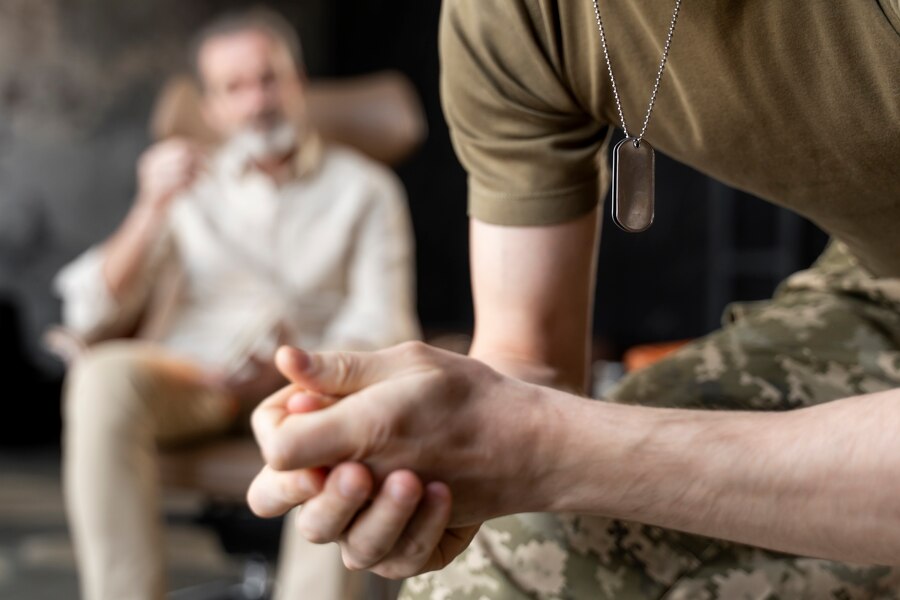Veterans often face unique and complex challenges when it comes to substance abuse. The stress and trauma experienced during military service, including exposure to combat and post-traumatic stress disorder (PTSD), can significantly impact their mental health and increase the risk of substance use disorders. Understanding these veteran-specific issues is essential for developing effective treatment plans that address not only the addiction but also the underlying psychological and emotional struggles.
The transition from military to civilian life can be fraught with difficulties, including issues with reintegration, relationship problems, and chronic pain from service-related injuries. These factors can exacerbate substance abuse and complicate recovery. Effective treatment must therefore address both the addiction itself and the broader emotional and psychological challenges veterans face, ensuring a comprehensive approach to their healing and recovery.
Substance Abuse Treatment Services
Understanding Veteran-Specific Substance Abuse Issues
Veterans often face substance abuse issues due to the stress and trauma experienced during their service. Common factors include exposure to combat, post-traumatic stress disorder (PTSD), and other mental health conditions that can lead to or exacerbate substance use disorders. Understanding these issues is crucial for developing effective treatment plans that address both the substance abuse and the underlying psychological and emotional struggles.
Substance abuse among veterans can be linked to a range of issues, including difficulties with reintegration into civilian life, relationship problems, and chronic pain from service-related injuries. Addressing these issues requires a treatment approach that not only targets addiction but also provides support for the complex emotional and psychological challenges faced by veterans.
Importance of Specialized Care
Specialized care for veterans involves tailored treatment plans that consider the unique experiences and needs of military personnel. This includes programs designed to address trauma, provide veteran-specific therapy, and integrate support services that acknowledge the challenges of transitioning from military to civilian life. Specialized care ensures that treatment is relevant and effective, increasing the likelihood of successful recovery.
Programs that offer specialized care for veterans often include services that address issues such as PTSD, military sexual trauma, and moral injury. By focusing on these specific aspects, treatment providers can offer more effective support and create an environment that fosters healing and recovery.
Inpatient Rehab Facilities for Veterans
Inpatient rehab facilities for veterans provide comprehensive care with around-the-clock medical and psychological support. These facilities offer a controlled environment where veterans can focus intensively on their recovery without external distractions. The 24/7 care ensures that medical and psychological needs are met promptly, which is essential for managing withdrawal symptoms and co-occurring mental health conditions.
Inpatient programs often include detoxification, individual therapy, group therapy, and educational sessions. The structured environment supports a full immersion in the recovery process, allowing veterans to address both their substance use and any underlying mental health issues effectively.
Components of Inpatient Programs
Inpatient programs for veterans typically include a range of services such as detoxification, where medical professionals help manage withdrawal symptoms and ensure a safe process. Therapy sessions, both individual and group, focus on addressing addiction, trauma, and other related issues. Additionally, educational sessions provide information on addiction, coping strategies, and recovery planning. Aftercare planning is also a crucial component, preparing veterans for continued support after leaving the facility.
Outpatient Treatment Programs
Outpatient treatment programs offer flexibility, allowing veterans to continue with their daily responsibilities while receiving treatment. These programs are beneficial for those who need support but have a stable home environment. They provide various levels of care, including Partial Hospitalization Programs (PHPs), Intensive Outpatient Programs (IOPs), and traditional outpatient counseling.
Types of Outpatient Services
Outpatient services vary in intensity and structure. Partial Hospitalization Programs (PHPs) offer a high level of care similar to inpatient settings but allow veterans to return home each evening. Intensive Outpatient Programs (IOPs) involve multiple therapy sessions per week but do not require full-time residence. Traditional outpatient counseling provides less frequent sessions and is suitable for those requiring ongoing support without intensive daily involvement.
Dual Diagnosis Treatment
Dual diagnosis treatment is essential for veterans who struggle with both substance abuse and co-occurring mental health disorders, such as PTSD or depression. This integrated approach ensures that both issues are addressed simultaneously, rather than treating one condition in isolation. Integrated care improves treatment outcomes by addressing the complex interplay between addiction and mental health issues.
Dual diagnosis programs typically involve a combination of medication management, psychotherapy, and counseling. By providing comprehensive care, these programs help veterans manage their symptoms and work towards recovery in a supportive environment.
Tailored Approaches for Complex Needs
Veterans with dual diagnoses require specialized approaches that cater to their unique needs. Treatment plans often include trauma-informed care, which acknowledges the impact of military experiences on mental health. This tailored approach ensures that veterans receive the most appropriate care for their specific circumstances.

Veteran-Specific Therapy Approaches
Trauma-informed therapy is a crucial component of treatment for veterans, addressing the impact of traumatic experiences on addiction and mental health. This approach involves understanding, recognizing, and responding to the effects of trauma. Therapy is designed to create a safe and supportive environment where veterans can process their experiences and work towards healing.
Cognitive Processing Therapy (CPT)
Cognitive Processing Therapy (CPT) is a specialized form of therapy used to treat PTSD and related conditions. CPT helps veterans understand and change unhelpful thought patterns related to their trauma, supporting them in processing and moving past these experiences. This therapy is particularly effective for veterans dealing with trauma-related issues and addiction.
Holistic and Complementary Therapies
Holistic therapies are increasingly recognized for their role in supporting comprehensive addiction treatment, especially for veterans. These therapies address the whole person—mind, body, and spirit—rather than just focusing on the symptoms of addiction. Two prominent holistic therapies are yoga and meditation, which offer significant benefits for managing stress and enhancing emotional well-being.
Nutritional Counseling
Nutritional counseling plays a vital role in the recovery process, particularly for veterans who may have experienced physical damage due to substance abuse. Proper nutrition is essential for repairing the body, restoring energy levels, and supporting overall health. Substance abuse can deplete essential nutrients, weaken the immune system, and disrupt metabolic processes. Nutritional counseling addresses these issues by providing tailored guidance on healthy eating habits and balanced nutrition.
Family and Couples Therapy
Family therapy involves including family members in the treatment process to address relationship issues and improve communication. For veterans, this therapy can help repair and strengthen family bonds, which are crucial for a supportive home environment. Family therapy also provides education about addiction and recovery, helping family members understand and support their loved one’s journey.
Couples Therapy
Couples therapy is an essential component of addiction treatment for veterans, as it addresses the impact of substance use on relationships and helps partners navigate the complexities of recovery together. Substance abuse often affects not only the individual but also their relationships, leading to communication breakdowns, trust issues, and emotional distress. Couples therapy provides a structured environment where partners can work together to address these challenges, strengthen their relationship, and support each other throughout the recovery process.
Aftercare Programs
Aftercare programs are designed to provide ongoing support and resources for veterans after they have completed primary addiction treatment. These programs are essential for ensuring a smooth transition from intensive treatment to everyday life and for helping veterans maintain the progress they have made. Aftercare is a critical component of the recovery process, as it addresses the need for continued support and guidance in managing the challenges of post-treatment life.
Relapse Prevention Strategies
Relapse prevention is a crucial aspect of long-term recovery, as it involves developing strategies to manage triggers, cravings, and high-risk situations that could lead to a return to substance use. Effective relapse prevention helps veterans remain focused on their recovery goals and maintain their commitment to sobriety. It is an ongoing process that requires vigilance, planning, and the use of various coping mechanisms.
Find Substance Abuse Treatment Options for Veterans in Washington D.C.
Finding effective substance abuse treatment in Washington, D.C. requires a comprehensive approach tailored to the unique needs of veterans. Couples Rehab provides a range of treatment options, from inpatient and outpatient programs to specialized therapies and aftercare support. By addressing both the substance use disorder and the specific challenges faced by veterans, these treatment options offer hope and a path to recovery. With the right support and resources, veterans can overcome addiction and build a healthier, more fulfilling life. Contact us today to learn more about veteran-focused treatment programs and discover how we can support your journey to recovery.
FAQs
Veterans face unique challenges in their journey to recovery. Here’s what you need to know about substance abuse treatment options in Washington, D.C.:
1. What are the specific challenges veterans face in overcoming addiction?
Answer: Veterans often grapple with PTSD, traumatic brain injuries, and other mental health conditions alongside addiction. Finding treatment addressing these co-occurring disorders is crucial.
2. Are there specialized treatment programs for veterans in Washington, D.C.?
Answer: Many treatment centers in Washington, D.C., offer programs tailored to veterans, understanding their unique needs and experiences. These programs incorporate trauma-informed care and military-specific support.
3. How can I find a VA-approved treatment facility in Washington, D.C.?
Answer: Contact the Department of Veterans Affairs (VA) to inquire about VA-approved treatment options in Washington, D.C. They can provide information on eligibility and enrollment.
4. What types of treatment are available for veterans struggling with addiction?
Answer: Treatment options for veterans include inpatient, outpatient, and residential programs. Additionally, medication-assisted treatment (MAT) and therapy are often incorporated.
5. How can I access mental health services alongside addiction treatment as a veteran?
Answer: Veterans can utilize VA healthcare services for mental health support. Many addiction treatment centers in Washington, D.C., offer integrated care addressing both addiction and mental health.
6. What financial assistance is available for veterans seeking addiction treatment?
Answer: The VA offers various benefits and programs to help veterans with addiction treatment costs. Explore options like the Veterans Benefits Administration (VBA) for potential financial assistance.
7. How can family members support a veteran in recovery?
Answer: Family involvement is crucial. Attend family therapy sessions, educate yourself about addiction and PTSD, and offer unwavering support.
8. What are the signs of substance abuse in veterans?
Answer: Be aware of changes in behavior, mood, and social interactions. Signs may include increased isolation, difficulty sleeping, irritability, and changes in appetite.
9. How can I find a support group for veterans in recovery in Washington, D.C.?
Answer: Veterans Affairs (VA) facilities often offer support groups. Additionally, organizations like the Wounded Warrior Project and the Veterans of Foreign Wars (VFW) provide support networks.
10. What is the long-term outlook for veterans in recovery from substance abuse?
Answer: With appropriate treatment and support, veterans can achieve lasting recovery. Continued care, such as therapy and peer support, is essential for long-term success.


